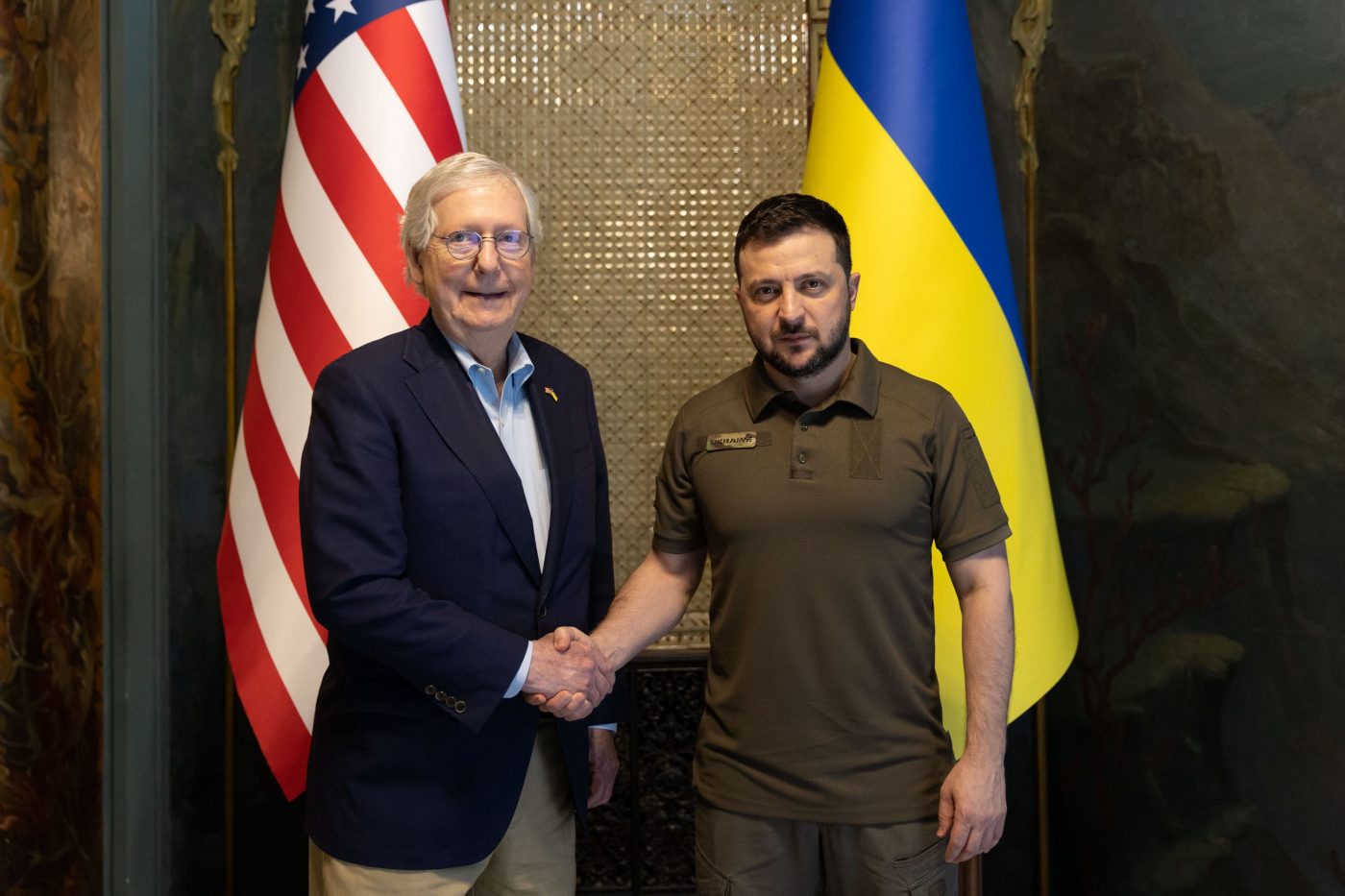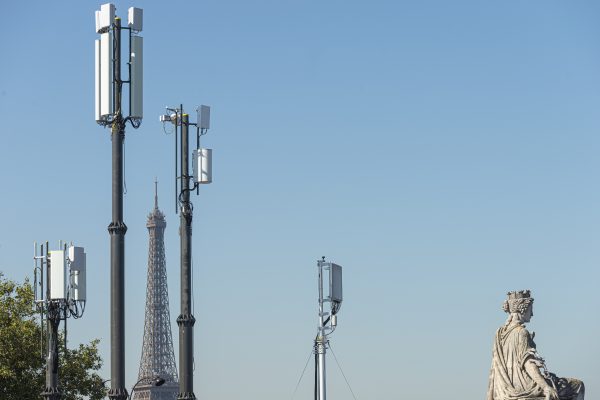Alina Polyakova: Hello, I’m Alina Polyakova, President and CEO of the Center for European Policy Analysis, or CEPA. Welcome to the 2023 CEPA Forum, Winning the War, Winning the Peace. It is my honor on behalf of CEPA to present our Transatlantic Leadership Award to Senator from Kentucky Senate Minority Leader, the Honorable Mitch McConnell for his steadfast leadership and support for Ukraine. Senator is such a pleasure to see you. Thank you so much for taking the time and thank you for accepting our award and for everything you’ve done to ensure consistent US support for Ukraine.
Mitch McConnell: Well, thank you. I’m pleased to receive the award and happy to see you again, I think we met in Munich. And I remember, you were speaking up and I remember saying, I totally agree with what I just heard.
Polyakova: Well, part of that conversation that we had back then goes into what we want to talk about today. You have been on the floor of the Senate making the case for why it’s in the US’ vital interest to support Ukraine. But of course, we’ve seen some of the public opinion numbers over the last years, and year and a half since Russia’s full-scale invasion, we are seeing some decline in support, especially among the US public. So Senator, let’s just get into it. Why do you think it’s in the US’ vital interest to make sure that Ukraine wins this war against Russia?
McConnell: I think it’s an easy call. We’re lined up here against China, Russia, North Korea, and Iran. That ought to tell you right from the beginning, that you’re on the right side. Second, we’re not losing any American military personnel. The Ukrainians are doing the fighting themselves. As a result of the weapons transfers that we’ve made to Ukraine, we’re re-industrializing our base here in the United States, and employing a significant number of Americans, people in this country, building our industrial base again. I think it’s an easy call. In the context of our GDP, it’s a really small fraction that we’re providing for this effort in Ukraine. If Putin is to win this, some NATO country will be next. And I think it’s a lot smarter to just stop this invasion, to push him back. And the only personnel prepared to engage in that are Ukrainians themselves who’ve been quite courageous and committed. And I think it’s an inspiration to the rest of the world that actually elect their leaders, and doesn’t have autocrats running the countries.
Polyakova: And, Senator, I know you have had the opportunity to go to Ukraine in May of last year. Of course, President Zelenskyy also spoke to a joint session of Congress last year as well. And President Zelenskyy was just in Washington this last week. In terms of making the case to the American people, one thing you said I want to follow up on; that’s the relationship between our support for Ukraine as the United States government and the military-industrial base. Can you expand on that a little bit? How does supporting Ukraine actually support US jobs in the military-industrial complex? Because we’ve heard a lot about that.
McConnell: As we ship weapons and ammunition to the Ukrainians, we rebuild those and many instances with more modern cutting-edge equipment. And we need to be rebuilding our industrial base anyway, wholly aside from the Ukraine war because of the rising competition from Russia, and China. There are some Americans who say, “Well, this is a long way from the Far East, and that’s where our real concerns are.” Well, the Prime Minister of Japan said if you want to send President Xi a message beat Putin in Ukraine. The South Koreans are concerned, the Filipinos are concerned, the Australians are concerned. So it does have a huge impact on Asia and the future of Taiwan.
Polyakova: And this is really a test of the future of US global leadership, isn’t it? When it comes down to it, that if we win in Ukraine, that will secure US global leadership for the long term. And if we allow Russia to defeat Ukraine, or to accomplish something that President Putin can call a win, that will be detrimental to the future of US leadership, not just in Europe, but in the Indo-Pacific and across the globe.
McConnell: Yeah, I mean, we ended up taking a holiday from history after the Berlin Wall came down. The Germans basically signed up with the Russians for their energy. And I think we all acted as if evil had somehow stopped. Well, I can remember my, I was not old enough, but my dad told me, after he got back from fighting in Europe, of the fear they had in what is now the Czech Republic, of the Russians. That’s where they met the Russians at the end of the war. And he was a regular foot soldier, he wrote my mother a letter saying, “I think we’re going to have a problem with the Russians.” After a brief period after Yeltsin, I think, we thought this was the country that was going to act differently. President Bush and President Obama tried to treat Putin as a sort of normal leader. But it’s pretty clear that the path is very similar to the old Soviet Union. And they’ve got to be stopped.
Polyakova: Well, let me stick with that point. Because of course, in many ways, what Putin is doing now is very much in line with centuries of Russian history and Russian imperialism and the desire to really base Russian identity on control of territory, and territories that the people who live in, those territories don’t want to be part of the empire. And I think that’s what we’re seeing in the kind of courage that you’re describing among Ukrainians, now, they’re making very clear, they want to be part of the West, they want to be allied first and foremost, in the United States. They don’t want to be part of the Russian Empire. And I think it behooves us as a democratic society, as you’ve said before, to support them. But let me just go back to the rising skepticism we see not just among the American people who, you know, by the way, when they’re given information about the low cost, and the bang for the buck we’re getting by supporting Ukraine, as you describe, do change their minds about support. There’s been some polling to show that. But also in the US Congress, I mean, it’s no secret that many, both on the Republican side, also some on the other side, are skeptics and some are even advocating to cut support for Ukraine at this really critical juncture in the war. What will be the cost of doing that? What will be the cost of pulling the plug in support?
McConnell: Well, the reason Republican support is declining is the opposition of the former president. That’s the bad news. The good news is the leadership here in Congress of armed services and foreign relations and intelligence, appropriations, are still very much in this camp of supporting the Ukrainians. I think the American people are being to some extent misled. I don’t think they understand the facts. And as what I tried to do for whatever audience I had, you just tell the truth. No one American is getting killed. We’re replenishing our industrial base and our people and I think over 30 states [are] in the process of rebuilding our defense. It is very much related to Asia. And the two biggest big power adversaries we have now are Russia and China. So I believe that repeating the facts, hopefully, willl sustain the position of support.
Polyakova: So on your point about the vision for victory. You know, there are certainly critics out there, and you’ve been one of them, of the Biden administration’s policy towards Ukraine, that it’s, as you’ve said, previously, it’s been indecisive. And that it should be up to Congress to be more decisive and not to repeat that policy failure. So what would you like to see the United States do now at this moment, to support Ukraine towards winning, that we haven’t yet done?
McConnell: Well, my big criticism of the President is that he is not aggressive enough. You know, I think they make an announcement about a weapons transfer, and you read the fine print, and you find out it won’t be there for six months or a year. So I basically am aligned with the administration, but I think the President has done a poor job of delivering the weapons support on time and making the argument to the American people. Nobody has a bigger audience than whoever’s president. And here you have the current president, with a big audience, and the former president with a big audience, it is no wonder the former president has more influence on Republicans. Not surprising.
Polyakova: So I think we all would love to see President Biden make the case to the American people and use his broad appeal and loud voice to do that. He’s done that in Poland. But he hasn’t done that in the United States for quite some time. And I think that’s something that all of us would like to see more of, to your point on leadership and what that looks like. Let me just wrap up with one last question. You alluded to the link between what’s happening in Ukraine and the Indo-Pacific. I think, to a lot of people, it’s not clear. How does it matter that if we support Ukraine, how will that really affect, you know, our greatest long-term strategic competitor or adversary, which is, of course, China? Can you make that connection clear? What is the link between supporting Ukraine and our security in the Indo-Pacific and our ability to deter China?
McConnell: Well, at the risk of repeating myself, I think the people most frightened about East Asia are countries that are actually there. The prime minister of Japan, the president of Korea, are deeply concerned about this, and they are right next door to China. I think they know more about the threat from China related to the Russian war in Ukraine than we do. I don’t think they’re making this up there. They’re sending money. They’re sending equipment to a different part of the world because they think it’s directly related to President Xi and China and China’s aspirations in the region.
Polyakova: And of course, we see a situation on the other side, where countries like Iran, North Korea, China, are all in various ways supporting Russia. So we’re really, I think, seeing the emergence of this authoritarian alliance. Once again, as you said, we took a break from history, but history has returned to bite us in a very, very painful and significant way. So Senator, thank you for your leadership. Thank you for your time. Thank you for giving us the honor to honor you for your voice and steadfast support for Ukraine. I know you have a very busy time ahead these next couple of weeks. And we from CEPA wish you all the luck and certainly hope that we will come out in a positive way not just for Americans, but for all the Ukrainians that are losing their lives every day, fighting for freedom, liberty, and democracy. Thank you very much for your time, for joining us here today.
McConnell: Thank you.
Polyakova: Thank you for tuning in to the 2023 CEPA Forum Transatlantic Leadership Award conversation with Senator Mitch McConnell, CEPA’s 2023 honoree. Please remember to tune into our website cepa.org. Follow us on social #CEPAForum, YouTube, X, LinkedIn, wherever you get your news. Thank you very much, and stay tuned.




